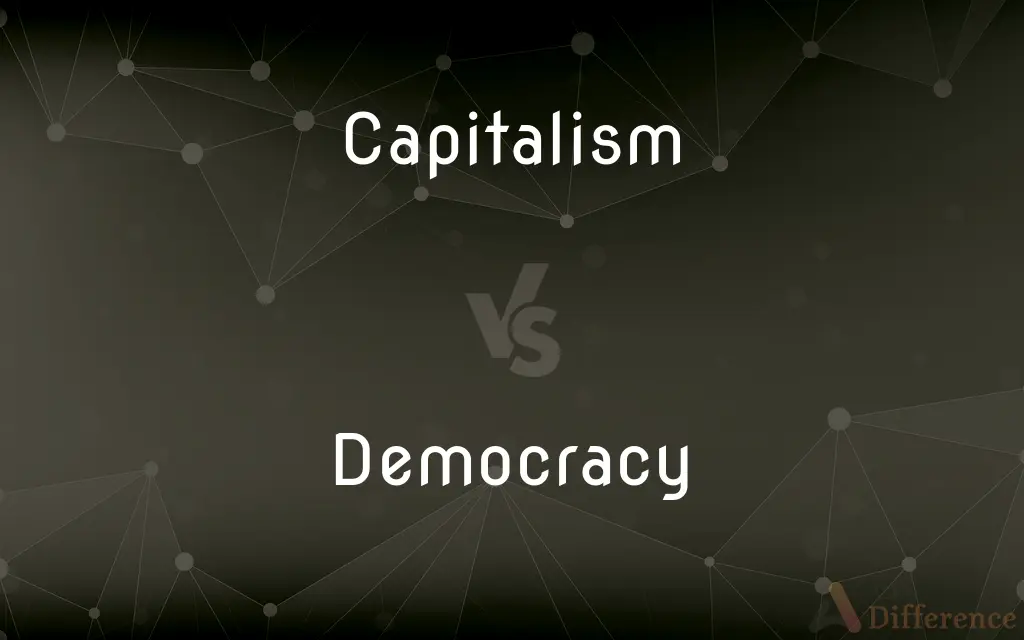Capitalism vs. Democracy — What's the Difference?
Edited by Tayyaba Rehman — By Maham Liaqat — Updated on April 18, 2024
Capitalism, an economic system based on private ownership and profit motive, contrasts with democracy, a political system where power lies with the people through free elections.

Difference Between Capitalism and Democracy
Table of Contents
ADVERTISEMENT
Key Differences
Capitalism centers on private ownership and the operation of businesses for profit. In this system, market forces largely determine resource allocation and prices. Whereas democracy emphasizes political equality and the participation of the populace in decision-making processes through elected representatives.
In capitalism, individuals and corporations own the means of production and compete in the market. This competition is supposed to drive innovation and efficiency. On the other hand, democracy focuses on governance by the majority, with protection for minority rights through laws and regulations.
Capitalism is inherently linked to economic freedom, where businesses operate with minimal government intervention. Whereas, democracy involves various degrees of government control and regulation, intended to ensure fairness and protect the rights of all citizens.
The success of capitalism is often measured by economic growth and the wealth generated. In contrast, the success of democracy is typically assessed by the degree of political freedom and equality among citizens.
While capitalism can lead to economic disparities due to uneven accumulation of wealth, democracy aims to balance this through representative governance and legal frameworks that can include social safety nets.
ADVERTISEMENT
Comparison Chart
Basis of system
Private ownership and profit
Political equality and participation
Main focus
Economic freedom and efficiency
Governance by the majority
Measure of success
Economic growth and wealth
Political freedom and equality
Role of government
Minimal intervention
Regulatory and protective
Outcome concerns
Wealth accumulation
Rights protection and fairness
Compare with Definitions
Capitalism
Minimal government interference in business activities.
In a capitalist economy, the market dictates prices more than any government policy.
Democracy
Decisions are made based on majority rule but protect minority rights.
Democracy ensures that even the smallest minority's rights are respected.
Capitalism
Promotes innovation through competitive pressures.
The capitalist push for lower production costs often leads to technological advancements.
Democracy
Provides mechanisms for changing leaders and laws non-violently.
Democracy facilitates peaceful transitions of power through regular elections.
Capitalism
Economic system where private parties own and operate businesses.
Under capitalism, most factories are owned by individuals or companies, not the government.
Democracy
Government by the people, either directly or through representatives.
Modern democracies usually have elected officials who make decisions on behalf of their constituents.
Capitalism
Characterized by the pursuit of profit and market competition.
Capitalism drives companies to innovate to stay ahead of competitors.
Democracy
Emphasizes equality and participation in governance.
In a democracy, every adult citizen typically has the right to vote.
Capitalism
Wealth and resources are unevenly distributed based on market success.
Capitalism can result in significant wealth for successful entrepreneurs.
Democracy
A political system in which power is derived from the people through elections.
Democracy allows citizens to vote for their leaders and laws.
Capitalism
Capitalism is an economic system based on the private ownership of the means of production and their operation for profit. Central characteristics of capitalism include capital accumulation, competitive markets, a price system, private property and the recognition of property rights, voluntary exchange and wage labor.
Democracy
Democracy (Greek: δημοκρατία, dēmokratiā, from dēmos 'people' and kratos 'rule') refers to a form of government in which the people either have the authority to choose their governing legislators, or the authority to decide on legislation. Who is considered part of the people and how authority is shared among or delegated by the people has changed over time and at different speeds in different countries, but more and more of the inhabitants of countries have generally been included.
Capitalism
An economic system in which the means of production and distribution are privately or corporately owned and development occurs through the accumulation and reinvestment of profits gained in a free market.
Democracy
Government by the people, exercised either directly or through elected representatives.
Capitalism
(politics) A socio-economic system based on private ownership of resources or capital.
Democracy
A political or social unit that has such a government.
Capitalism
(economics) An economic system based on private ownership of the means of production and their operation for profit.
Democracy
The common people, considered as the primary source of political power.
Capitalism
A socio-economic system based on private property rights, including the private ownership of resources or capital, with economic decisions made largely through the operation of a market unregulated by the state.
Democracy
Majority rule.
Capitalism
An economic system based on the abstraction of resources into the form of privately owned capital, with economic decisions made largely through the operation of a market unregulated by the state.
Democracy
The principles of social equality and respect for the individual within a community.
Capitalism
An economic system based on predominantly private (individual or corporate) investment in and ownership of the means of production, distribution, and exchange of goods and wealth; contrasted with socialism or especially communism, in which the state has the predominant role in the economy.
Democracy
(uncountable) Rule by the people, especially as a form of government; either directly or through elected representatives (representative democracy).
Capitalism
An economic system based on private ownership of capital
Democracy
A government under the direct or representative rule of the people of its jurisdiction.
Democracy
(countable) A state with a democratic system of government.
Democracy
(uncountable) Belief in political freedom and equality; the "spirit of democracy".
Democracy
Government by the people; a form of government in which the supreme power is retained and directly exercised by the people.
Democracy
Government by popular representation; a form of government in which the supreme power is retained by the people, but is indirectly exercised through a system of representation and delegated authority periodically renewed; a constitutional representative government; a republic.
Democracy
Collectively, the people, regarded as the source of government.
Democracy
The principles and policy of the Democratic party, so called.
Democracy
The political orientation of those who favor government by the people or by their elected representatives
Democracy
A political system in which the supreme power lies in a body of citizens who can elect people to represent them
Democracy
The doctrine that the numerical majority of an organized group can make decisions binding on the whole group
Common Curiosities
How does capitalism influence economic growth?
Capitalism can drive significant economic growth by encouraging competition and innovation.
What role do elections play in a democracy?
Elections are fundamental in democracy, as they allow citizens to choose their leaders and influence government policies.
How do wealth disparities develop under capitalism?
Wealth disparities in capitalism arise from unequal access to resources and differences in business success.
How does democracy protect minority rights?
Democracy protects minority rights through laws and constitutions that prevent majoritarian rule from infringing on minority interests.
What are common criticisms of capitalism?
Common criticisms of capitalism include fostering economic inequality and focusing excessively on profit at the expense of social welfare.
How does public participation manifest in democracy?
Public participation in democracy is often expressed through voting, but also through public debates, protests, and civic activities.
Can capitalism and democracy coexist?
Yes, many countries successfully maintain both capitalist economies and democratic governments.
What mechanisms ensure fairness in capitalism?
Fairness in capitalism is often regulated by laws that ensure competition, prevent fraud, and protect consumer rights.
What is the main advantage of democracy in government?
The main advantage of democracy is that it allows for the representation and participation of the general population in government.
Is there any governmental control in capitalism?
While capitalism advocates for minimal governmental interference, some oversight is often necessary to regulate and prevent monopolies and unfair practices.
How do societal values influence democracy?
Societal values shape democracy by influencing what is considered important in decision-making processes and in the election of representatives.
How does democracy address the issue of an ineffective leader?
Democracy allows for the removal of ineffective leaders through regular elections or, in some cases, impeachment processes.
How does democracy handle economic policy?
Economic policies in democracies are shaped by elected representatives and are often the subject of significant public debate and voting.
Can capitalism affect political processes?
Yes, economic power under capitalism can influence political processes, sometimes leading to policies that favor the wealthy.
What is the relationship between capitalism and innovation?
Capitalism often promotes innovation as companies seek competitive advantages in the market.
Share Your Discovery

Previous Comparison
Appraisee vs. Appraise
Next Comparison
Peloton vs. PeletonAuthor Spotlight
Written by
Maham LiaqatEdited by
Tayyaba RehmanTayyaba Rehman is a distinguished writer, currently serving as a primary contributor to askdifference.com. As a researcher in semantics and etymology, Tayyaba's passion for the complexity of languages and their distinctions has found a perfect home on the platform. Tayyaba delves into the intricacies of language, distinguishing between commonly confused words and phrases, thereby providing clarity for readers worldwide.
















































